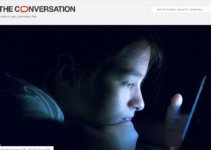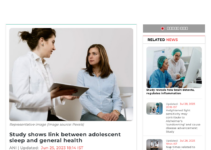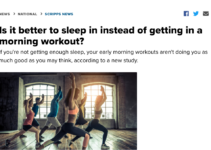The study presented at the 2023 Annual Meeting of the American Academy of Sleep Medicine and the Sleep Research Society in June 2023 revealed that increased exposure to light before sleep during pregnancy is associated with a higher risk of gestational diabetes. The researchers concluded that increased evening light exposure in pregnancy may be an under-recognized, potentially modifiable risk factor for gestational diabetes and suggested that future research should investigate light-targeted interventions as a potential preventive strategy.
The study aimed to evaluate the relationship between evening light exposure and the incidence of gestational diabetes during pregnancy. Previous research has shown a link between mistimed light exposure and impaired glucose regulation in nonpregnant women, but there is limited research on the effect of evening light exposure during pregnancy. Therefore, the researchers sought to assess the relationship between evening light exposure prior to sleep, during pregnancy, and the incidence of gestational diabetes.
The results showed that compared to women with low duration of presleep light exposure, women in the high and medium groups had an increased risk for gestational diabetes. The high group had an odds ratio of 5.49, while the medium group had an odds ratio of 4.05. Additionally, women in the high group had more daytime light exposure and were less likely to be late or fragmented sleepers.[0]
The findings of this study highlight the importance of considering evening light exposure as a potential risk factor for gestational diabetes. It suggests that reducing light exposure before sleep during pregnancy could be a preventive strategy for gestational diabetes. Further research is needed to explore the mechanisms behind this association and to develop interventions targeting light exposure to reduce the risk of gestational diabetes.
In addition to the study on gestational diabetes, other research has shown disparities in sleep patterns related to living environment and race or ethnicity. While sleep disparities exist across the board, the effects are not equal among all races and ethnic groups.[1] Black and Hispanic people are more likely to have worse sleep duration patterns overall, but only white participants had significantly less sleep when exposed to poorer neighborhoods from teenage years to early adulthood.
These sleep disparities are influenced by cultural and individual factors. It is a time when racial and ethnic disparities begin to increase in areas of health, including sleep duration.[1] The findings suggest that addressing these disparities requires a comprehensive understanding of the social determinants of health and targeted interventions to improve sleep quantity and quality.
Sleep deprivation has been linked to various health issues, including cardiovascular disease. Regular sleep patterns, as well as the quantity of sleep, play a role in cardiovascular health. Research has shown that the benefits of exercise and cognitive function in older adults are influenced by both physical activity and sleep.[2] Therefore, it is important to consider both factors when promoting healthy aging.
Sleep also affects other aspects of health, including weight, mental health, focus, and relationships. As the importance of sleep becomes more recognized, it is crucial for individuals to prioritize and improve their sleep habits. The U.S. Centers for Disease Control and Prevention (CDC) provides tips for better sleep, such as keeping the bedroom quiet and relaxing, maintaining a comfortable temperature, and avoiding screens before bed.[3]
Despite the growing awareness of the importance of sleep, many people still do not get enough sleep. Approximately one-third of Americans aged 18-64 and 26% of adults aged over 65 do not get enough sleep.[4] This lack of sleep is associated with an increased risk of cardiovascular disease in the long term.
The prevalence of sleep deprivation is particularly high in certain regions. For example, Kentucky ranks fourth in the percentage of adults reporting less than seven hours of sleep per day, and the Appalachian counties within the state have even higher rates of sleep deprivation.[5] These disparities highlight the need for targeted interventions and policies to improve sleep health in these areas.
In response to the increasing demand for sleep tech devices, there have been rapid advancements in technology to develop innovative devices that monitor and improve sleep quality. Wearable sleep trackers, smart mattresses, and smart pillows are among the devices that offer accurate sleep tracking, personalized sleep insights, and features to enhance sleep. The growth of sleep tech devices has been fueled by the widespread use of wearable devices and smart home technology.
Overall, the research on sleep patterns and health outcomes emphasizes the importance of sleep for overall well-being. It is crucial for individuals to prioritize and improve their sleep habits to maintain good health and prevent chronic diseases. Additionally, addressing sleep disparities and promoting equitable access to quality sleep is essential for improving population health.
0. “Light Exposure Before Sleep May Raise Gestational Diabetes Risk” www.neurologyadvisor.com, 12 Aug. 2023, https://www.neurologyadvisor.com/reports/light-exposure-sleep-gestational-diabetes-risk-sleep-2023/
1. “ASU study: Living in impoverished neighborhoods in adolescence to …” news.asu.edu, 12 Aug. 2023, https://news.asu.edu/20230623-discoveries-asu-study-living-impoverished-neighborhoods-adolescence-early-adulthood-can
2. “Short sleep negates benefits of exercise for the brain, study says …” www.wsiltv.com, 12 Aug. 2023, https://www.wsiltv.com/news/health/short-sleep-negates-benefits-of-exercise-for-the-brain-study-says/article_e39c0762-cce0-57c0-ae98-be69bf10aaad.html
3. “Bad Sleep Can Harm Your Heart, and Weekend ‘Catch-Up' Sleep …” www.fox41yakima.com, 12 Aug. 2023, https://www.fox41yakima.com/bad-sleep-can-harm-your-heart-and-weekend-catch-up-sleep-wont-help/
4. “Harvard professor ‘debunks myth' that you need eight hours of sleep …” www.mirror.co.uk, 12 Aug. 2023, https://www.mirror.co.uk/news/us-news/harvard-professor-debunks-myth-you-30476604
5. “Kentuckians report some of country's lowest average sleep …” www.wdrb.com, 12 Aug. 2023, https://www.wdrb.com/news/kentuckians-report-some-of-countrys-lowest-average-sleep-durations-new-study-finds/article_a8af63ac-35fe-11ee-b16b-5341c52116bd.html





